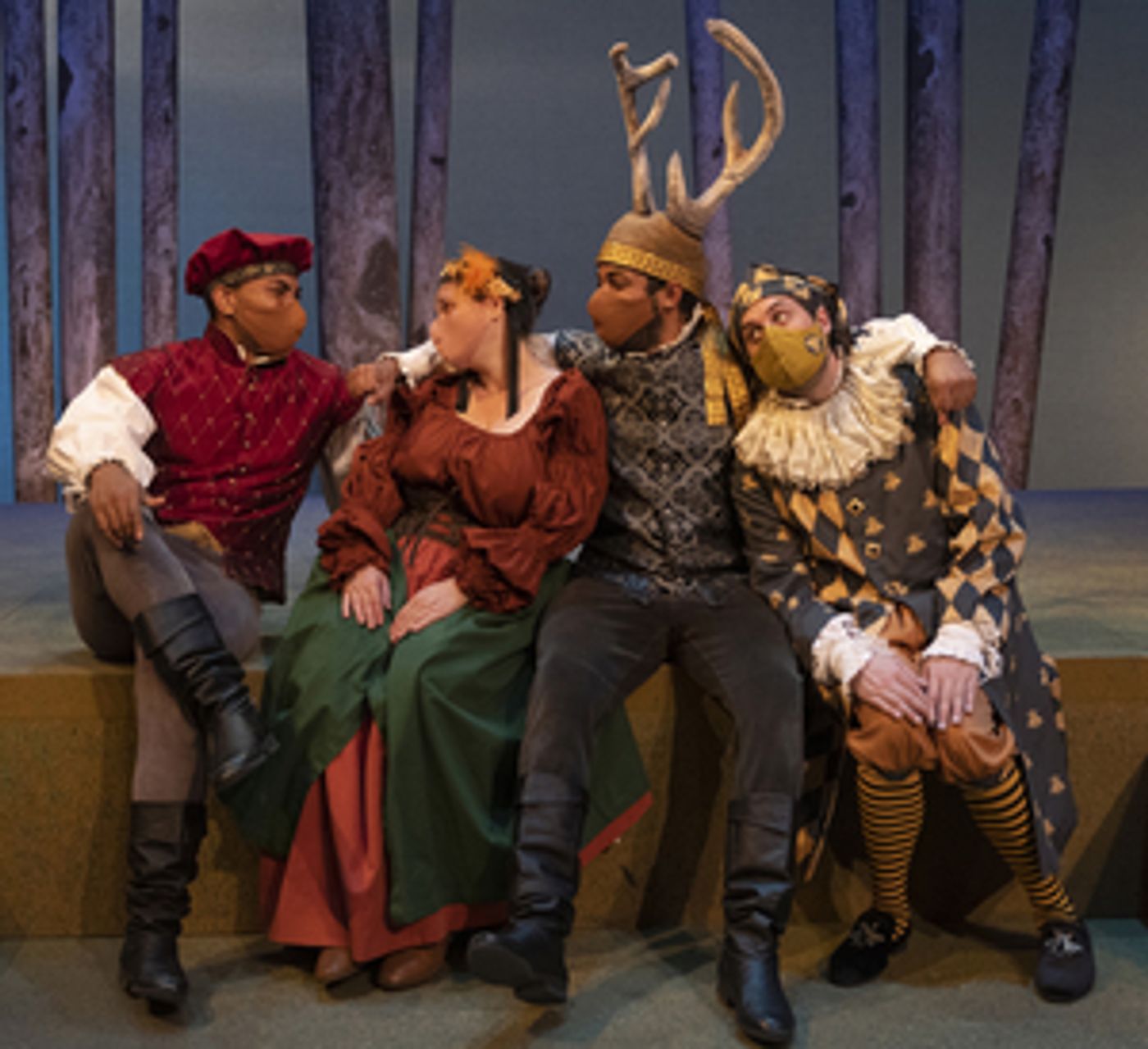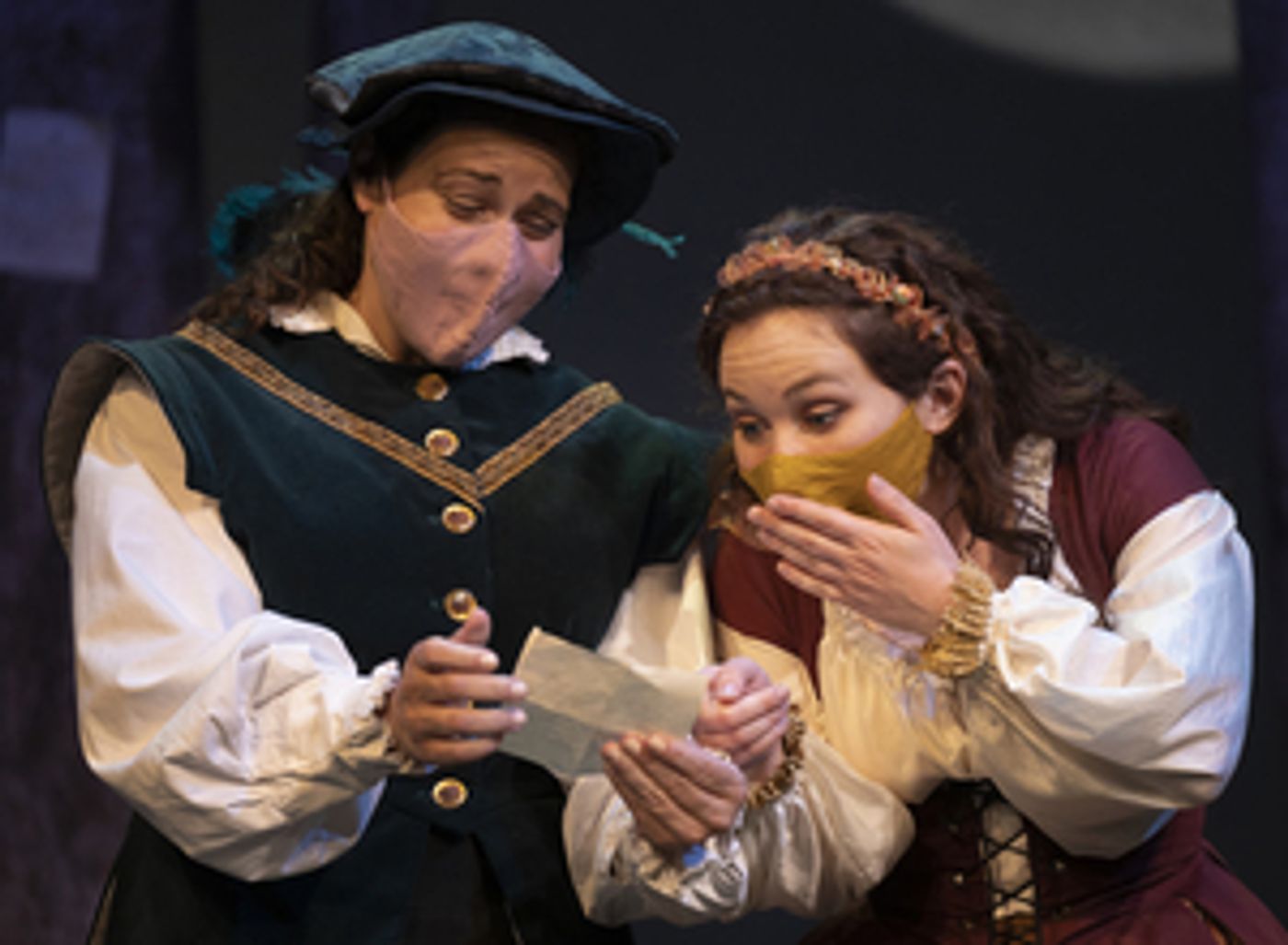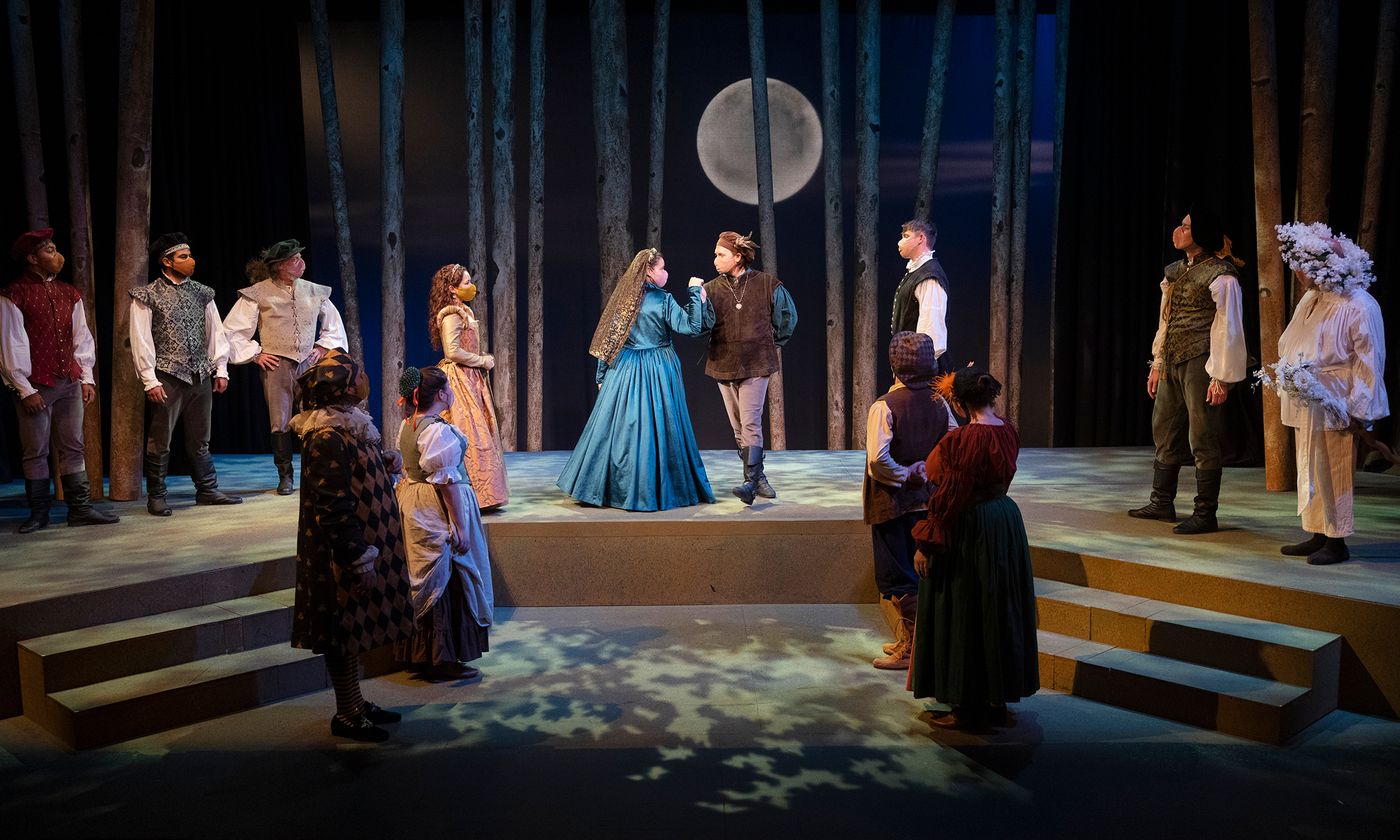Review: AS YOU LIKE IT Beguiles and Delights at The Rogue Theatre
Season Finale Delivers Old-fashioned Comedic Romp


Among Shakespeare's thirty-seven plays, AS YOU LIKE IT might pass for a modern musical comedy if not for the distinction of a lone singer who bears the brunt of the songs. In any case, the musical numbers are engaging and congruous to the play's rhythm and style.
Shakespeare gets the usual credit for the song lyrics, but a familiar academic chatter lingers with regard to their true source and origin.
The argument hardly matters, frankly. The Rogue Theatre has adapted the poetry to original music, beautifully composed and arranged by music director Russell Ronnebaum. It was pre-recorded with a musical trio and sung principally by actor Jeffrey Baden as Amiens.
The songs are redolent of late-Renaissance compositions by Thomas Morley, who once wrote a madrigal titled "Now is the Month of Maying" and was best known for his playful innuendoes about young love and spring fever. Despite its exclusion from the repertoire, the song is apropos of Shakespeare's slick double entendres and gives credence to the rumored collaborations between playwright and composer.
There's a good bet you're at your wits' end from lockdowns and social distancing. If so, you're encouraged to visit The Rogue Theatre for a creative diversion. 'Tis the month, Morley reminds us. It is spring and love is lush -- like a six-part madrigal and a swath of daffodils in the Elizabethan pasture.
A caveat: You'll have to keep your masks on. The actors at The Rogue have done as much all season long.
We all know The Rogue to be well-versed in the Shakespearean canon (pardon the pun). In fact, we're not sure there's a company in town with a comparable knack for dramatic poetry. But I'd be remiss to ignore the impeccable timing of the show: an old-fashioned comedic romp is what any decent therapist might prescribe for the occasion. AS YOU LIKE IT is a fitting conclusion to a season marked by a plaintive, albeit provocative moral inventory.
The production is directed with lyrical charm by Cynthia Meier, whose sense of movement and composition suits a dignified ensemble. Nowadays there's much ado about innovation in staging Shakespeare's plays, but here Meier renders a classical treatment that brings ample theatrical delight all the same.
Love at first sight, in all its impetuous glory, is central to the comedy. The best element of the production is its impeccable clarity of language, thanks to the actors' lucid pre-recording of the bard's script. I know what you're thinking: Why bother acting with a disembodied voice and risk losing an actor's significant emotional muscle? Well, it's about choosing your battles.
The protective mask is the elephant in the room, made no less of an obstacle by the lip-syncing of the actors' lines. While it's not a deal breaker, it raises the urgency for an actor to amplify her presence without risking the character's integrity. After all is said and done, text should be rooted in physicality. It's a noteworthy trait in a few standout performances: Bryn Booth as Celia, Aaron Shand as Orlando, Erin Buckley as Phoebe, Julia Balestracci as Audrey, and Hunter Hnat as Sylvius (watch him do wonders with his eyes amidst the crowd). Carley Elizabeth Preston makes a competent Rosalind, but she's at her best as the shepherd boy Ganymede (as she should be), practically commanding the second act with authority.

It's a dynamic group of Rogue veterans, no doubt primed in the coming days for heightening Shakespeare's moral arc. For now we have a cast fitfully attuned to an essential objective, which is consummate surrender to the laws of the wild. As they all must leave the stoic court behind, it's prudent to concede to the rugged temperament of the forest. Props to Nanalee's gorgeous Renaissance couture, but the actors perhaps ought to treat the forest like they aren't afraid to get slimy and bedraggled. Too many folks remain unscathed by an otherwise harrowing experience.
Shakespeare was by no means the only writer who used the wilderness as a metaphorical terrain, but no other playwright illuminated the forest with poetic distinction, and certainly not with his artful brew of wizardry and seduction. Our befuddled mortals traverse the uncertain path to the Forest of Arden, lured by the concealed promise of sanctuary and transformation. Meanwhile emotions will be high, and behaviors irrational -- exactly how the forest affects mere mortals before said transformation is earned. In the wild we renounce our worldly decorum and get downright ugly. Passion should never be compromised.
For those unfamiliar with the plot, it's an easy click to a Wiki link. For what it's worth, a synopsis barely scratches the surface of Shakespeare's linguistic maze. At its core is the author's unabashed proclamation of love, but it's also a commentary on society's antiquated mindset about a woman's agency. Shakespeare prompts a clever discourse about gender equality and a woman's resolve to claim her potential, even as she assumes the artifice of a man's identity.
On a side note, casting a play in the Elizabethan theatre must have been exciting given the impressive pool of male talent available. But as Shakespeare was clearly influenced by Commedia dell'arte and its work with stock characters, he had to be impressed by the Italians' progressive move to hire the first female actors in history. Alas, our greatest playwright faced the impermeable reality of carrying out a critical dramatic conceit, vis-a-vis gender reversals, with an all-male ensemble.
Joseph McGrath plays Jacques, a melancholic contrarian with the iconic speech about the seven ages of man. But McGrath is best noted for the minimalist logic of his set design -- a pleasing open space on two levels that allows for the fluid staging of a large ensemble. Forest of Arden is symbolized by a row of round, painted vertical columns upstage (there's a luminous, oversized full moon behind the scrim). It's conceptually effective, though it's bound to betray the untutored eye who can't see the forest for the trees, as it were. Sometimes the theatre boasts its finest illusions when the set is stripped of inessential stagecraft, and here McGrath's scenic clarity ensures the immersive artistry of Don Fox's lighting design. The lighting transitions, coupled with Ronnebaum's musical underlay, are simply a thing of beauty.
If for no other reason than blunt desire for connection beyond our quarantined lives, the audience, despite opening night's relative silence, feels wholly engaged in this swirling fantasy of renewal. The theatre is akin to the forest; it brings mystery and healing. However short-lived, we get our kicks from vicarious adventures through flawed but intrepid characters, what with their reckless abandon and concomitant discoveries on full display.
The Rogue's compliance with health guidelines, in terms of audience seating, is much appreciated. But as we look ahead to better days without fear of contaminating one another, there's a good chance we'll find a deeper appreciation for social gatherings of this nature. It's not a stretch to presume a growing community of discerning art consumers in our beloved pueblo, inasmuch as theaters like The Rogue have paid meticulous attention to rich language and theatrical innovation. For years we've seen that trend with the company's diverse choices of literary material and unflinching pursuit of new approaches, notwithstanding the predictable infusion of a Shakespearean classic.
It's time to spread the word. Spring is back and the theatre is alive. Obviously, this team is indefatigable and remains true to its moniker. Amidst a crushing pandemic, The Rogue Theatre simply refused to close its doors. This season's culminating production of AS YOU LIKE IT, with all its pomp and luster, is another testament to the company's audacity to thrive against all odds.
Photo credit: Tim Fuller
AS YOU LIKE IT runs through May 9. Video streaming runs April 29-May 16
For tickets, contact The Rogue Theatre
www.theroguetheatre.org ~ 300 East University Boulevard, Suite 150, Tucson, Arizona ~ 520-551-2053
Reader Reviews
Videos

